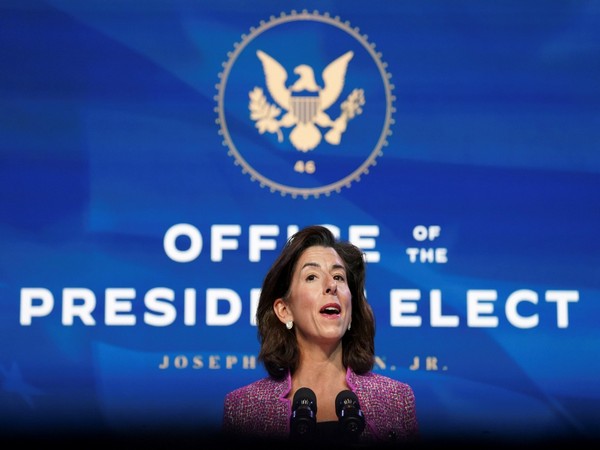Biden's commerce secretary nominee promises very aggressive stance on China
Former US President Donald Trump's aggressive stance on China is set to continue as President Joe Biden's nominee who will head the US Department of Commerce Gina Raimondo told the Senate that she will be very aggressive against China's unfair trade practices.

Washington: Former US President Donald Trump's aggressive stance on China is set to continue as President Joe Biden's nominee who will head the US Department of Commerce Gina Raimondo told the Senate on Tuesday that she will be very aggressive against China's unfair trade practices.
"China's actions have been anti-competitive, hurtful to American workers and businesses, coercive and ... culpable for atrocious human rights abuses, so whether it's the 'entity list' or tariffs or countervailing duties, I intend to use all those tools to the fullest extent possible," Raimondo testified during her confirmation hearing in the Senate as quoted by South China Morning Post (SCMP).
"Having said that, China has clearly behaved in ways that are anti-competitive, dumping cheap steel and aluminum into America, which hurts American workers and hurts the ability of our companies to compete," Raimondo added as quoted by The Washington Post and continued, "So should I be confirmed, I plan to be very aggressive to help Americans compete against the unfair practices of China."
According to The Washington Post, Raimondo said she believes that the Commerce Department needs not only to "play defense" against China but also to "play offense" by doing more to promote US technology, including by getting more involved in the global organisations that set tech standards.
Wilbur Ross, the commerce secretary during the former President Donald Trump's administration, put Huawei on an "entity list" in May 2019, citing national security concerns, a move that prevented US suppliers from selling goods and technology to the company without a special licence.
Also Read |
Most radical left-wing administration': Trump slams Biden for 'bowing down' to China
When Senator Ted Cruz, a Texas Republican, demanded an assurance that Raimondo would not remove Huawei from the list, the nominee committed only to "review the policy, consult with you, consult with industry, consult with our allies and make an assessment as to what's best for American national and economic security".
SCMP reported further that Senator Ben Sasse, Republican of Nebraska, questioning Raimondo's stance, called it ridiculous.
"This is ridiculous," Sasse said in a statement. "Huawei didn't change because America has a new president. Huawei is still the Chinese Communist Party's tech puppet and a serious threat to national security... Tough talk on China is empty if you let Huawei out of the box," he added.
Raimondo told Cruz and other senators questioning her a commitment to safeguarding against possible national security threats posed by the use of Chinese telecommunications equipment.
"There's an opportunity to move forward in 5G and create great innovation and jobs, but we can't have the Chinese or really anyone having a back door into our network and compromising in any way our national or economic security," she said.
Also Read | International: 'Biden's climate plan will give free pass to worst polluters like China, Russia, India'
"I will use the full toolkit at my disposal to the fullest extent possible to protect Americans and our network from Chinese interference or any kind of back door influence into our network, and that's Huawei, ZTE, or any other company," she added.
"Today, President Donald J. Trump directed departments and agencies to review applicable laws, regulations, and policies and to propose regulatory and policy changes, including potential executive actions, to minimize the procurement of People's Republic of China (PRC) goods and services by the Federal Government."
Under the Donald Trump administration, ties between the two countries had deteriorated over issues such as human rights violations in Xinjiang, encroachment on the special status of Hong Kong, accusations of unfair trade practices by Beijing, lack of transparency concerning the pandemic and China's military aggression in various parts of the world. (ANI)
 Dynamite News
Dynamite News 